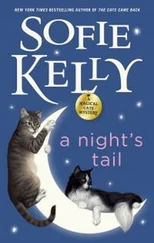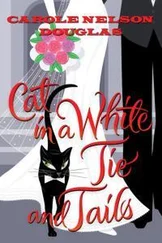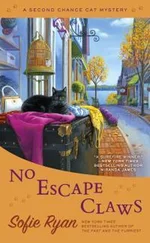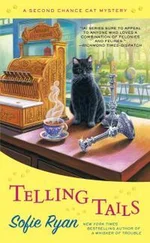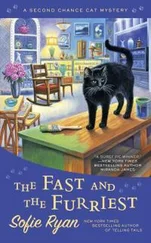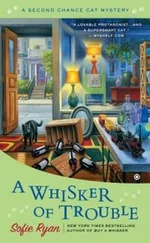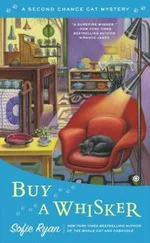She’d seen me trying to wedge a finger under the splint on my left arm. I’d dropped a cardboard box full of old elementary school readers on that arm, injuring a tendon in the palm of my hand a couple of weeks earlier. I had to wear the plastic and neoprene splint for another two weeks and it was driving me crazy. It itched. A lot. Rose had already caught me trying to jam my toothbrush underneath the splint to get some relief. She’d confiscated the toothbrush and I’d gotten a stern speech about mouth germs, skin infections and the four stitches at the base of my thumb. Then she’d given me a bowl of warm rhubarb crisp as a distraction from the itching.
I made a face at her now and she made one right back at me before gently squeezing my arm.
I tucked a strand of hair that had slipped free from my ponytail behind my ear and looked over at Tom’s yard, trying to shift my attention away from the sensation that ants were marching in formation up my wrist. Tom’s lawn was probably the most perfectly manicured one in North Harbor, Maine. Maybe even in the entire state. No weeds dared poke their heads up in the two planters that flanked the front door and ran the length of the house on either side. Tom had replaced the bulbs that had been eaten by the voles with little clay pots of daffodils and paper whites and today had started replacing those with white and pink geraniums.
The grass around his small, gray-shingled story-and-a-half house was mowed to a length of precisely an inch and three-quarters, which Tom deemed the correct height for that particular type of grass. The only incongruity was the small strip of lawn that separated his driveway from the yard of his neighbor, Angie Bates. There the grass had been sheared so short in places there was nothing but bare earth.
Tom followed my gaze. “How can that miscreant be Angie’s family?” he asked.
I didn’t think he really wanted an answer to the question. “He’ll be leaving soon, and Angie will be home,” I said.
The old man gave a snort of derision, and the color rose in his face. “I’m not convinced that ne’er-do-well is even employed. He’s extremely evasive. Even Angie wasn’t clear on what he does for a living, assuming he does anything.” He looked toward the small white Cape Cod–style house on the other side of the choppy strip of grass.
Angie—Angelica Bates—was an anthropologist who taught part-time in the Environmental Education Department at Unity College. The “he” Tom was speaking so derisively about was her nephew, Jason. Angie had no children. She was a bit of a free spirit with a wild mass of long blond curls streaked with gray and her dark-framed glasses always slipping down her nose. When she wasn’t teaching, she was off somewhere in the world on a dig site. I’d taken two classes from Angie in college and was happy to find a familiar face on the street when I’d finally moved in. Every few months we’d get together and she’d regale me with stories about her travels.
Jason was the son of Angie’s older brother. “It’s taking him a bit of time to find himself,” she’d confided recently to Rose and me over tea and biscotti. I’d nodded and said nothing, looking pointedly at Rose as a hint to do the same. Rose had reached for her cup and kept her opinions to herself, although later when Angie had gone home, she’d tartly commented that it might be a little easier for Jason to find his missing “self” if he got out of bed before noon.
“Angie will be out of the hospital in a few days,” Rose said then, laying a hand on Tom’s arm for a moment. “Then things will get back to normal.”
“I don’t think things are going to get back to normal until that young man is gone,” he grumbled. Two furrows had formed between his bushy white eyebrows.
Jason Bates came out of the house then. Like his aunt, he was tall and lean, but that was where the similarities ended. Where Angie was fair, Jason was dark: deep-set dark eyes, spiked dark hair, navy shirt, black jeans. I noticed his eyes flick in our direction but he gave no other sign that he’d seen us. He jumped in Angie’s blue Mini Cooper, backed out of the driveway and sped out of the court.
I glanced toward the backyard again. Elvis had put down the burden he had been carrying in his mouth and was looking back toward Tom’s house, head tipped to one side, almost as if he, too, had questions about Jason Bates. He turned to look at me for a moment, then picked up whatever he’d caught in Tom’s yard and disappeared over the rock wall.
Rose and I walked with Tom back to his house. Standing at the bottom of the driveway, I could see what a mess Jason had made when he’d mowed the strip of lawn between the two houses. The ground had been gouged in a couple of places, and in others the grass was more than a couple of inches high. “Don’t worry,” I said. “It’s grass. It’ll grow.”
Tom didn’t seem the slightest bit comforted by my words. I remembered feeling much the same way when my mother had said those same words—“It’ll grow”—after I’d tried to cut my bangs with a pair of kitchen scissors when I was thirteen.
The old man had been mowing the small piece of lawn between his house and Angie’s for years, even though technically it was her property. Angie had always thanked Tom for what she called the courtesy. I suspected the courtesy was more Angie’s. Tom was finicky about his house and his property, and since the strip of grass was next to his driveway, I had a feeling he felt a bit of ownership, even if the lawn didn’t actually belong to him.
A couple of days previous, Tom had gotten out his push mower, clippers and broom to begin his lawn-mowing routine. He always started with the section of grass between the two houses, working from left to right across the front of the house and then repeating the process in the back. I’d been hanging quilts on the backyard clothesline. It was a slow, awkward process one-handed. I’d just gotten the second quilt in place when I heard raised voices and the sound of Tom’s little corgi Matilda’s agitated barking. I rounded the side of my house in time to see Jason shake his fist at the old man and then shove the lawn mower out into the street before storming back into Angie’s house.
I had hurried over to Tom. He was trembling, his face pale. The front door to his house was open, and I could see Matilda on her hind legs, paws on the screen, barking furiously. She was as protective of the old man as if she were a German shepherd or a Great Dane.
“What’s wrong?” I’d asked, putting a hand on Tom’s shoulder.
He’d turned to look at me and I noticed both of the old man’s hands were squeezed into fists, the skin stretched tightly over his swollen, arthritic knuckles. “That . . . that punk accused me of being a thief!”
“I don’t understand,” I said. “What does he think you took?” It had to be some sort of misunderstanding. Tom was honest to a fault. I didn’t think he’d so much as crossed against the light even once in his entire life.
The old man had gestured to the area of lawn where he’d been about to begin mowing. “He said my cutting the grass was an attempt at a land grab. He called it encroaching on Angie’s property.” He suddenly seemed aware that Matilda was still barking. He’d looked toward the front door and held out a hand, palm facing the ground. “Matilda, sit. Sit,” he’d called.
The little corgi stopped barking and sat down, but kept her nose pressed against the screen door.
Tom shifted his attention back to me again. “I’m not trying to steal any of Angie’s property,” he’d said. “I would never do something like that. I was just trying to be a good neighbor.”
“I know that,” I’d said, “and so does Angie.”
Читать дальше



![Джеффри Арчер - The Short, the Long and the Tall [С иллюстрациями]](/books/388600/dzheffri-archer-the-short-the-long-and-the-tall-s-thumb.webp)
